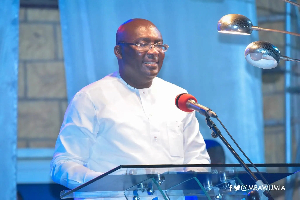Accra, Jan. 24, GNA - The Ghana Interbank Payment and Settlement System (GhIPSS) plans to introduce a National Switch and Direct Debit system in 2011 to help to improve the country's payment system.
Speaking in an interview with journalists in Accra on Sunday, the Chief Executive of GhIPSS, Mr Fred France said, the rollout of the National Switch, which will create a common platform for all the banks, was a major project that would significantly enhance the financial sector.
He said when the switch became operational, bank customers could use
their Automated Teller Machines (ATM) cards at any ATM machines.
Currently only banks signed onto Visa enjoy that service in the
country but with the National Switch any ATM can accept any card.
Besides, the various mobile money services can switch transactions,
allowing mobile money transfer from a subscriber of one network to
another network with ease.
This, Mr France said, would create a lot of convenience for both the
banks and their customers.
Mr France said there were also plans to use the National Switch to
link Ghana's platform to that of Nigeria's interbank payment system,
as well as that of the Francophone West African Monetary Zone (UEMOA).
He said GhIPSS would also be able to switch messages between the Visa
and Mastercard platforms when the system was in place.
He stressed that the National Switch would greatly enhance payments not only within Ghana, but across West Africa, saying that better days were
ahead.
He urged the public to embrace the new developments in order to save
time and cost.
On the Direct Debit, the CEO of GhIPSS, said it would soon go live,
however, some educational programmes would be done for banks and other
institutions such as utility providers, insurance companies and others
who regularly receive or pay lump sums of money.
These bodies would be trained on the use and benefits of the Automated
Clearing House (ACH). The ACH is like an electronic form of standing
order and can be used for regular or recurring payments such as
mortgage, hire purchase and utility bills.
Another major programme that GhIPSS would embark on in the course of
the year is a review of standards of cheques in the country to enhance
confidence in the use of cheques.
Mr France said GhIPSS would meet with banks to look at what additional
features could be added to cheques to aid the process of clearing
cheques under the Codeline Cheque Clearing System (CCC), which allows
cheques to be cleared in two days but GhIPSS aimed to reduce the time
further to a day.
"In order to achieve this target, GhIPSS wants to strengthen the
features on cheques to ensure that they are very secured," Mr France
said, adding that banks would be encouraged to agree to set a certain
limit, so that any cheque with a value above that limit would have to
be confirmed with the issuers before payment was effected.
GhIPSS will also intensify educational campaign to create awareness
and encourage the use of e-zwich and other products.
Mr France said another initiative that would be implemented this year
was the use of e-zwich Point of Sales (POS) devices at fuel stations.
He said GhIPSS would enter into a discussion with fuel station owners
and Oil Marketing Companies to explore the possibility of exclusively
using e-zwich cards after ten o'clock in the night.
Under this initiative, the fuel stations would accept both cash and
cards during the normal working hours. But after the ten o'clock in
the night, cash from the day's transactions would be lodged and only
e-zwich and other cards would be accepted.
This is to ensure that the fuel stations can operate for twenty four
hours, but would not be exposed to robbery.
GhIPSS said its objective for the various initiatives was to make
payment faster, more accessible and more secured in order to
facilitate business transactions.
Business News of Monday, 24 January 2011
Source: GNA
GhIPSS plans National Switch, other projects for 2011
Entertainment















